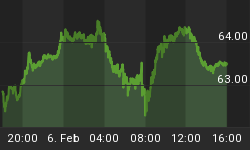Bloomberg authors By Steve Matthews and Tom Keene report Greenspan Says U.S. Stocks 'Very Cheap,' Likely to Rise
Former Federal Reserve Chairman Alan Greenspan said U.S. stocks offer good value and are likely to rise as corporate earnings increase over time.
"Stocks are very cheap," Greenspan said today at the Bloomberg Washington Summit hosted by Bloomberg Link, citing "a very low price-earnings ratio."
"There is no place for earnings to grow except into stock prices," said Greenspan, who served as Fed chairman from August 1987 to January 2006.
Another valuation metric, known as the Fed model because it was derived from a July 1997 report from the central bank, shows U.S. equities are close to the cheapest level ever relative to debt. The technique compares the earnings yield for stocks with Treasury rates.
Fed Model Idiocy
The Fed Model has been discredited so many times and in so many places, that Matthews and Keene should both know better than bring it up. For a discussion, please see Why Is Bad Advice So Common?
The general idea that stocks are "cheap" offers more further ground for intelligent debate, but I strongly disagree and said so recently in Misty Water-Colored Memories, Dirt-Cheap Stocks, and Patient Opportunism
Finally, history shows Greenspan to be one of the biggest contrarian indicators in history.
Greenspan is a Contrary Indicator
After warning about irrational exuberance in 1996, Greenspan embraced the "productivity miracle" and "dotcom revolution" in 1999. Mid-summer of 2000 Greenspan fell in love with his own analysis and was worried about inflation risks. Shortly thereafter the Greenspan Fed embarked on an incredible campaign slashing interest rates to 1% in panic over deflation.
Greenspan is now trumping up the idea that credit conditions are like 1998. I talked about this in No Greenspan, Conditions are NOT Like 1998.
On May 21,2006 Greenspan said housing prices won't fall nationally. That prompted me to write Greenspan Predicts Housing Bust.
History shows Greenspan was worried about Y2K problems (slashing interest rates and adding fuel to the dotcom bubble). Y2K went off without even minor glitches.
In 2001 Greenspan pleaded with Congress to adopt Bush's $1.35 trillion tax cut. Greenspan's rationale was the government would run huge $5.6 trillion surpluses over the subsequent decade after the cuts. It's right here in the Testimony of Chairman Alan Greenspan Before the Committee on the Budget, U.S. Senate January 25, 2001.
In 2007 Greenspan was worried about inflation. How did that work out?
Greenspan on the Daily Show
Towards the end of this Interview with Jon Stewart Greenspan admits he and the Fed did not know what they were doing and blamed it on "human nature".
Indeed! And that is why the Fed is always chasing its tail, and why Greenspan is wrong again today.















